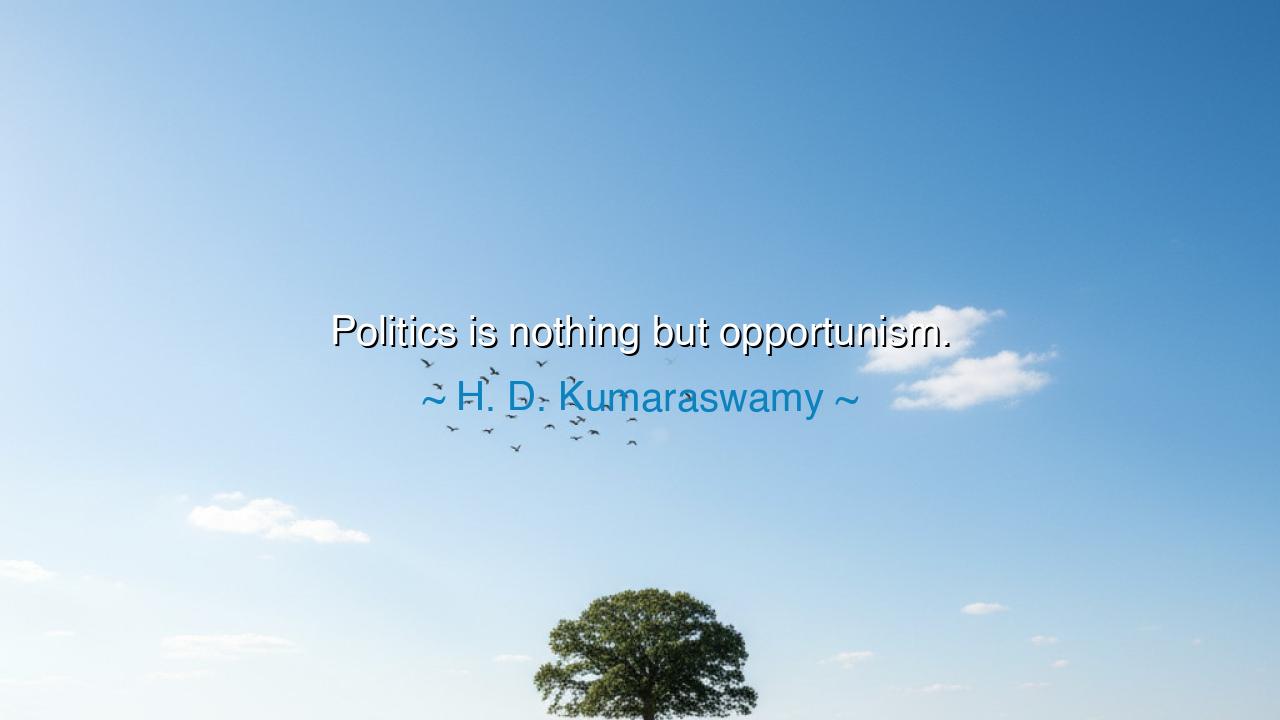
Politics is nothing but opportunism.






Politics, in its purest form, was meant to be the art of service—the noble labor of guiding a people toward justice and prosperity. Yet, as H. D. Kumaraswamy declared, “Politics is nothing but opportunism,” the reality often strays far from this ideal. His words are a lament, a cry born of experience, revealing how the political arena is frequently driven not by virtue, but by the ceaseless hunt for advantage. In this view, politics becomes a game of shifting alliances and calculated moves, where principles are discarded whenever they threaten ambition.
At the heart of this statement lies the idea of opportunism—the ability to seize favorable circumstances, even at the cost of loyalty or integrity. In politics, such opportunism manifests in broken promises, sudden betrayals, and policies shaped not by the needs of the people but by the desires of those who hunger for power. Kumaraswamy, a leader in the turbulent landscape of Indian politics, spoke these words from direct witness to the chaos of coalition governments, where survival often depends on swift, self-serving maneuvers rather than steadfast ideals.
History provides countless examples of this truth. In ancient Rome, Julius Caesar rose to prominence not merely through military brilliance, but through opportunistic alliances with rivals like Pompey and Crassus. When those alliances no longer served him, he turned against them, reshaping the Republic into an empire under his rule. His actions, though cunning, revealed how opportunism can transform a political system, for better or worse. Such stories repeat through the ages, proving that politics often bends to the will of those who strike at the right moment, regardless of moral cost.
Yet, Kumaraswamy’s statement also serves as a warning. While opportunism can achieve swift victories, it corrodes the foundation of governance. When citizens see leaders pursuing only their own gain, trust is shattered, and the people turn cynical or rebellious. The fall of monarchies and empires often begins not with foreign invaders, but with internal decay, born of leaders who traded the common good for personal advantage. Opportunism may win battles, but it cannot sustain nations.
This wisdom reaches beyond governments into the lives of ordinary people. In families, communities, and friendships, the temptation to act opportunistically can destroy harmony. Just as a politician must choose between service and self-interest, so too must each person decide whether to honor loyalty or to seize fleeting gain. The political world, though grand in scale, is but a reflection of the choices made by countless individuals.
Let this teaching echo through the halls of power: politics is a mirror of the human soul. If it becomes nothing but opportunism, it is because the hearts of leaders have forgotten their higher calling. Though Kumaraswamy’s words describe a painful truth, they also challenge future generations to rise above it—to create a form of politics where opportunity is not for self alone, but for the shared uplifting of all people. Only then can politics be redeemed from the shadows of ambition.






KNKhanhchi Nguyen
Part of me wonders whether this claim erases real examples of principle. Surely some leaders have sacrificed expedient gains to protect norms or minority rights. What conditions make such choices likelier—secure mandates, strong civil society, independent courts, or cultural honor for integrity? I’m seeking comparative cases where sticking to a line improved long-run trust, even if it cost immediate advantage. Conversely, show episodes where tactical brilliance produced backlash or policy whiplash. What lessons should citizens and parties carry forward from both?
TLPham Thanh Loc
Media incentives seem to supercharge opportunism: conflict clips outperform dry policy detail, and horse-race coverage rewards agility over depth. As a consumer, how do I support outlets that penalize flip-flopping without context while rewarding consistent, evidence-based adjustments? Suggest a personal media diet: track records over hot takes, follow beat reporters with source transparency, and favor formats that publish corrections. Are there dashboards that log public promises against outcomes? I want habits that make spectacle less profitable than good-faith governance.
QNQuynh Nhu
From an organizer’s perspective, the line between pragmatic coalition-building and being co-opted is thin. When should a movement accept partial wins versus walk away from a deal that dilutes core aims? Could you outline criteria—urgency of harm reduction, reversibility of concessions, community consent, and leverage gained for the next round? I also want tactics for resisting performative consultations that sap energy: escalation ladders, transparency agreements, and sunset clauses. How do we keep strategic flexibility without internal morale collapsing into cynicism?
HGNguyen hoang gia
This sounds like an incentives problem masquerading as a morality play. If rules reward tactical pivots, we’ll get more of them. Which institutional tweaks reduce the payoff of short-term maneuvering—ranked-choice voting, stronger conflict-of-interest rules, limits on post-office lobbying, or independent budget scoring? I’d love a matrix mapping reforms to predicted effects and trade-offs. For example: Does a change curb pandering but risk technocratic drift? Where have designs encouraged coalition-building without erasing accountability? Help me think systemically instead of simply lamenting character.
TNThuan Nguyen
From a voter’s seat, I’m looking for defenses against pure expediency. What signals predict steadiness under pressure—published decision frameworks, clear red lines, or demonstrated willingness to disappoint allies when evidence changes? Could we design a simple checklist for evaluating candidates: disclosure habits, donor concentration, attendance and committee work, stance reversals with documented rationale, and record of constituent services? I’m after actionable heuristics, not vibes. If politics often rewards opportunists, how can everyday scrutiny tilt incentives back toward reliability?